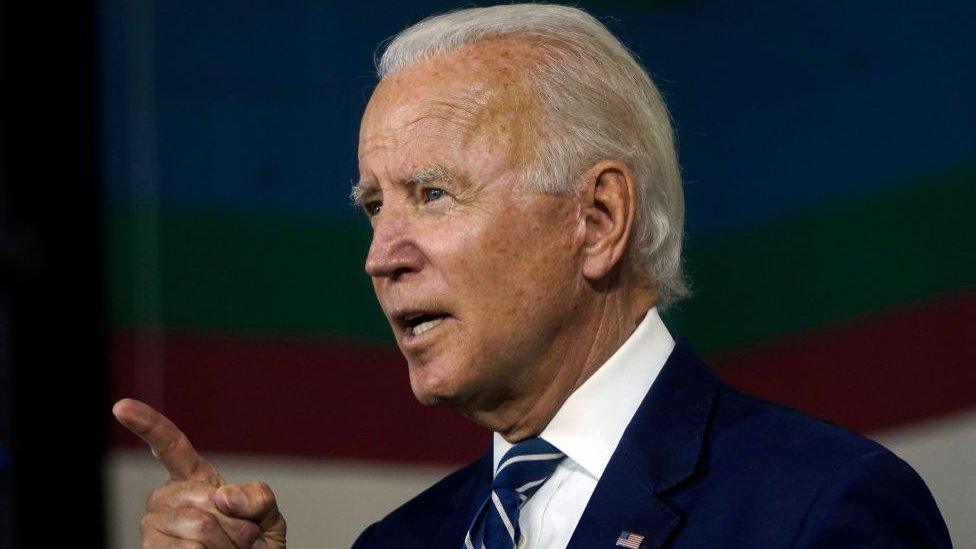Biden warns China will 'eat our lunch' on infrastructure spending
- Published

US President Joe Biden has spoken with Chinese President Xi Jinping
US President Joe Biden has warned that China will ÔÇ£eat our lunchÔÇØ if America doesnÔÇÖt ÔÇ£step upÔÇØ its infrastructure spending.
Mr Biden was speaking on Thursday with a group of senators about the need to upgrade infrastructure in the US.
His warning comes the day after his first phone call with Chinese President Xi Jinping.
On the call, Mr Xi took a hard line on human rights saying a confrontation would be a disaster for both countries.
Mr Biden made the comments after meeting with members of the Environment and Public Works committee.
ÔÇ£If we donÔÇÖt get moving, they are going to eat our lunch,ÔÇØ President Biden told senators.
ÔÇ£TheyÔÇÖre investing billions of dollars dealing with a whole range of issues that relate to transportation, the environment and a whole range of other things. We just have to step up.ÔÇØ
During the campaign, Mr Biden proposed spending $2tn (£1.45tn) over four years to create jobs and invest in clean energy infrastructure.
A widely cited American Society of Civil Engineers (ASCE) ÔÇ£report cardÔÇØ from 2017 gave the countryÔÇÖs infrastructure a grade of ÔÇ£D+ÔÇØ.
The ASCE estimated that the total ÔÇ£infrastructure gapÔÇØ needed $2tn by 2025 to fix, but would cost the economy twice as much if it went unaddressed.
The World Economic ForumÔÇÖs 2019 Global Competitiveness Report ranked the US 13th in a broad measure of infrastructure quality, down from fifth place in 2002.
Expect 'extreme competition' between US and China
China has been investing heavily in its infrastructure, pouring money into high-speed rail, metro systems, apartment buildings, electricity grids and mobile networks.
ÔÇ£They have a major, major new initiative on rail and they already have rail that goes 225 miles an hour with ease,ÔÇØ Mr Biden noted.
Human rights and diplomacy
President Biden also discussed several other points of friction with the Chinese President during his call.
The White House said he voiced ÔÇ£fundamentalÔÇØ concerns about BeijingÔÇÖs ÔÇ£coercive and unfairÔÇØ trade practices, as well as concerns over ChinaÔÇÖs crackdown in Hong Kong and treatment of Muslims in Xinjiang.
He also raised ChinaÔÇÖs increasingly assertive posture toward Taiwan and the countryÔÇÖs lack of transparency over Covid-19, said White House spokeswoman Jen Psaki.
Mr Xi maintained a hard line on Hong Kong, Xinjiang and Taiwan, calling them matters of ÔÇ£sovereignty and territorial integrityÔÇØ.
He told Mr Biden confrontation would be a ÔÇ£disasterÔÇØ and the two sides should re-establish the means to avoid misjudgements, ChinaÔÇÖs foreign ministry said.
Related topics
- Published4 February 2021